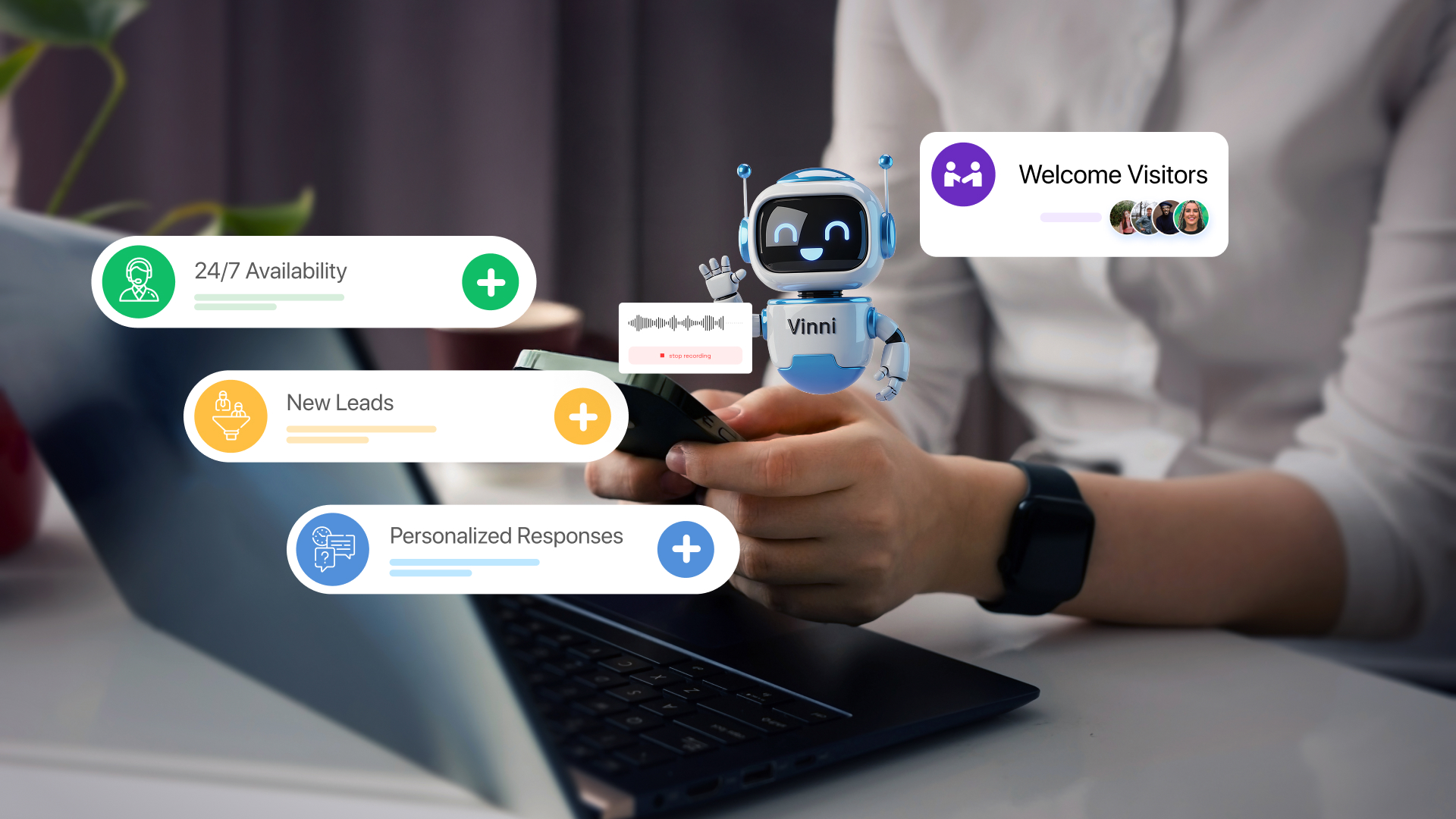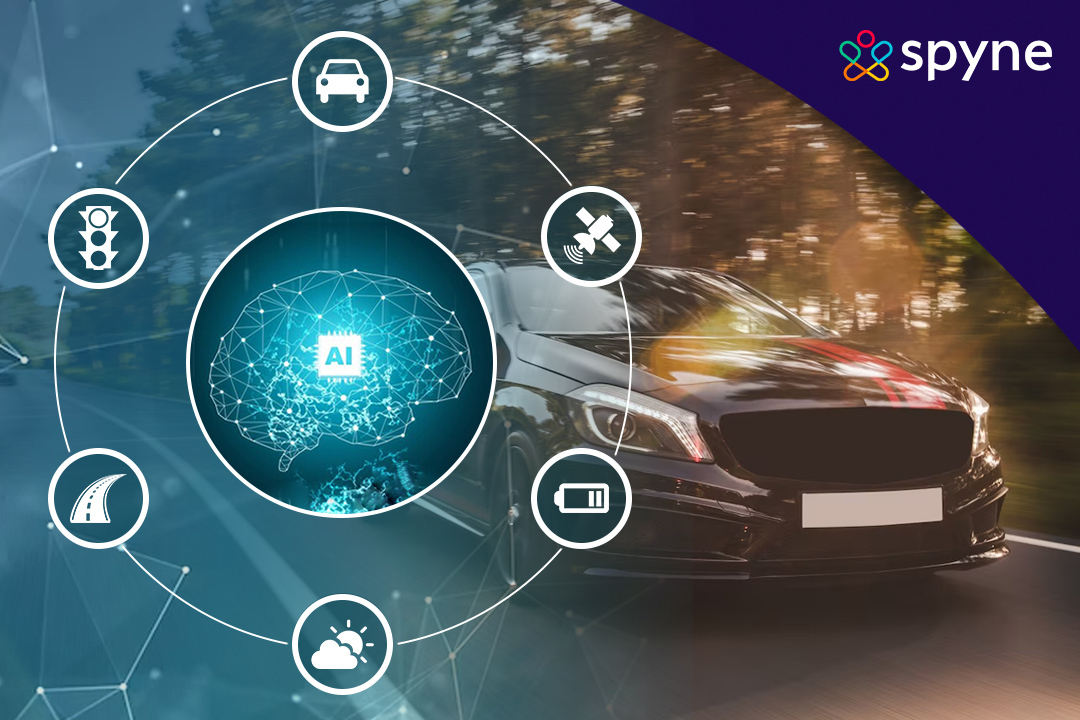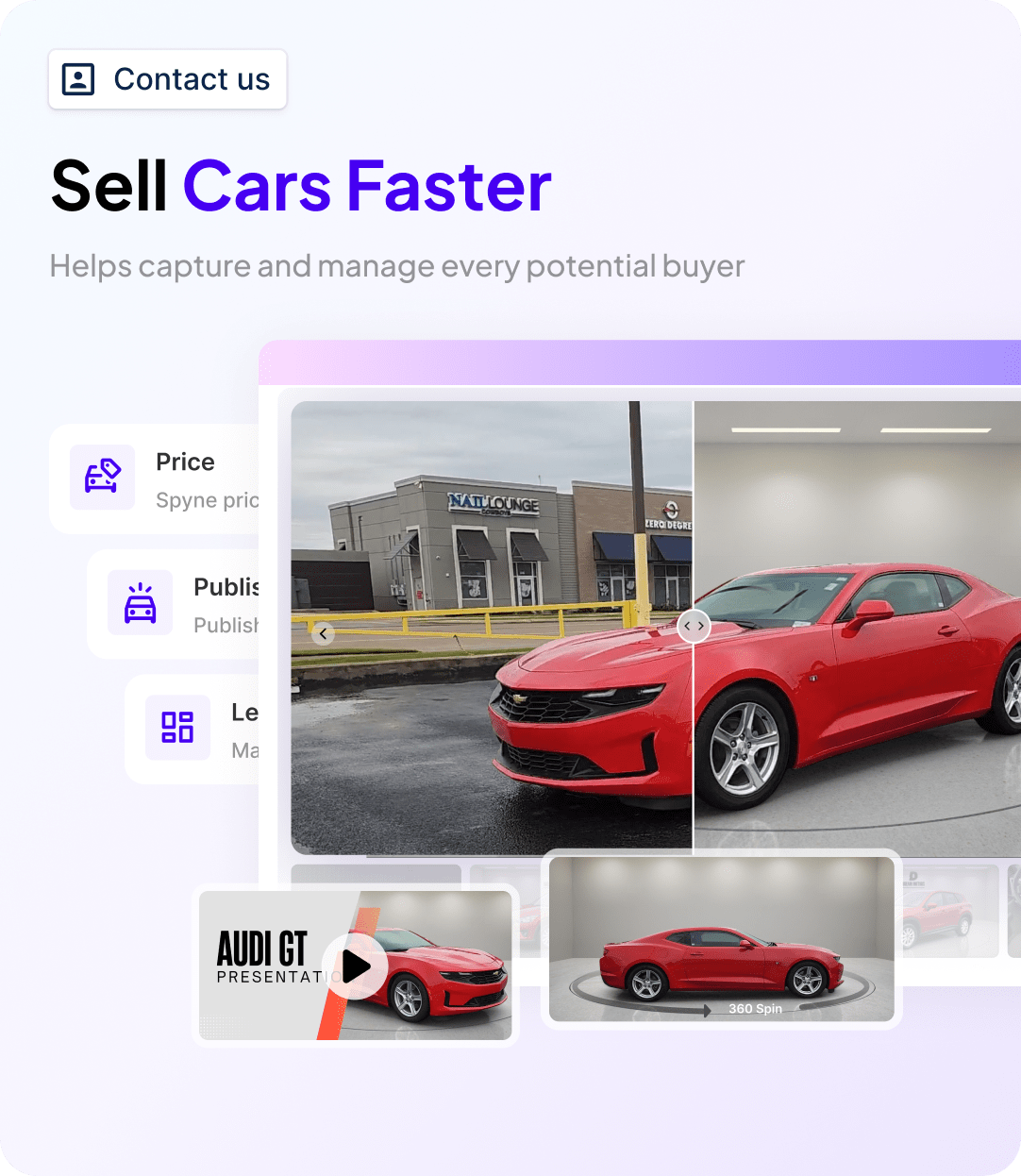Have you ever realized how AI is revolutionizing the automotive industry? Whether you take it from smart manufacturing systems to predictive driving, AI is transforming the way the automotive industry operates. Artificial intelligence has reduced the need for manpower and smoothed the workflow for everyone, including OEMs, car dealerships, part shops, and more. Not only this, but it is also elevating customer satisfaction by meeting their expectations. AI in automotive industry is not an option in this digital era. In fact, it is a necessity for everyone in the automotive industry to deliver an immersive experience for buyers.
In this blog, we will discuss how AI is revolutionizing the automotive industry, helping OEMs and dealerships to streamline their workflows, and assisting buyers throughout their car research & purchasing journey to drive it. So, let’s dive deeper into this topic and explore it.
How AI is Transforming Vehicle Design and Development?
Saying we are going to use AI features in cars would sound futuristic a decade ago. However, it’s very normal these days. In fact, most of the vehicles these days come with some amazing AI-integrated features. Likewise, cars are now equipped with AI-driven safety systems, voice assistants, smart navigation, and predictive alerts. But it’s not just limited to vehicles only. AI-powered automotive solutions are increasingly involved in every aspect of car manufacturing, from design to development and beyond. It starts at the drawing board where cars are designed. Moves to the factory floor where cars are assembled. Continues into the dealership where AI agents help customers, delivering an immersive car-buying experience.
AI in Autonomous Driving and Advanced Driver Assistance Systems (ADAS)
When we ask How do you see a futuristic car? The first thing that comes to mind is a self-driving car. Well, some of the OEMs have already begun working on autonomous technology. However, there is still some time before we reach fully autonomous Level 5. Further, AI-powered systems have already made cars significantly safer. These features fall under Advanced Driver Assistance Systems (ADAS) and include:
- Automatic emergency braking
- Lane keeping assist
- Adaptive cruise control
- Traffic sign recognition
- Blind-spot detection
- Driver monitoring systems
These systems work because AI constantly analyzes data from cameras, sensors, radars, and LiDAR. It processes real-time information, predicts risks, and helps the car take preventive actions, often faster than a human could.
Even semi-autonomous functions available today have reduced accidents, improved road safety, and given drivers more confidence. And as AI continues to advance, we’ll see even more vehicles transition to hands-free driving.
Generative AI: Redefining Automotive Prototyping and Simulation
Generative AI in automotive can create or generate original content such as text, images, video, audio, or software code in response to an individual’s prompt or request. Gen AI in automotive is often used to create content, simulations, designs, and software code. Let’s discuss in more detail:
1. Instant Concept Generation: Designers working in automotive can describe an idea in simple text into multiple design options using the Gen AI in seconds. This gives new ideas for designs that have not been previously imagined.
2. Virtual Prototyping: It can help you build high-quality 3D models with high accuracy and simulate how they’d behave under different conditions in real life. It can even predict the structural weaknesses or highlight areas where material usage can be optimized.
3. Faster Engineering Validation: With Gen AI, you don’t need to do hundreds of physical prototype tests. Instead, you can run simulations that mimic years of driving, thousands of weather conditions, and countless stress tests. This reduces development time, cuts costs, and helps manufacturers bring new models to market much faster.
How AI is Enhancing In-Car Experience For Buyers?
AI in cars is evolving into intelligent digital spaces, giving an immersive in-car experience for buyers. It adds personalization, convenience, and intelligence to driving experiences. Let’s discuss in detail how AI in automotive is enhancing the in-car experience for everyone:
1. Natural Voice Assistants: Now, the vehicles come with AI-powered assistants, which can adjust the AC temperature, play songs, make calls, and more. You can do it all through simple voice commands.
2. Predictive Personalization: With advanced artificial intelligence technology instilled in cars, it can learn driver habits. It typically understands when drivers usually go to work, which route they often take, and their sitting positions. It automatically adjusts the settings itself, offering drivers a smooth and comfortable driving experience.
3. Real-Time Insights: Afraid of getting stuck in traffic? Do not worry, these AI features now provide drivers with both traffic alerts and hazard warnings. The AI processes a huge amount of data to help drivers stay informed and safe.
4. Entertainment & Productivity: With Gen AI, cars can summarize emails, generate playlists, recommend content, or help with on-road productivity. Elevating drivers’ driving experience.
OEMs are launching cars with numerous automotive system integration with AI features. Cars currently come with Level 2 car features, which include partial driving automation such as adaptive cruise control, parking assistance, and lane change assist. The industry is pushing toward Level 3 and Level 4 automation. These features will allow vehicles to drive themselves in a very complex environment.
What Is The Impact Of AI In Manufacturing and Supply Chain?
The manufacturing of cars has changed a lot over the past few years. AI has transformed how factories operate and cars are manufactured. AI is involved in every aspect of car manufacturing, from smarter robots to predictive quality checks. It is helping OEMs build cars faster, safer, reduce costs, and boost overall productivity.
1. Smarter Manufacturing Lines: AI-powered machinery and systems in factories increase productivity, accuracy, and reduce errors. These AI machineries and systems perform repetitive tasks with precision, freeing human workers to focus on higher-value roles.
2. Predictive Quality Control: OEMs are now using AI machines for conducting quality checks. They can automatically detect defects early, sometimes even before they occur. These machines help manufacturers avoid costly recalls or rework.
3. Better Supply Chain Management: AI is helping automakers overcome challenges that global supply chains are facing, such as delays and shortages. AI helps manufacturers predict demand, balance inventory, pre-detect disruptions, and plan alternative sourcing routes. This ensures that manufacturing stays on schedule and reduces financial risks.
4. Energy Resource Optimization: AI in car manufacturing factories monitors machine usage, energy consumption, and material flow. This helps manufacturers cut waste and operate more sustainably.
What Is The Role Of AI in Predictive Maintenance and Diagnostics
Generative AI with telematics (GPS and onboard diagnostics) and real-time sensor analyzes, a vast array of data, and predicts part failures before they actually happen. This helps OEMs reduce downtime, extend car life, and simplify the management of large fleets of cars.
These systems generate personalized service alerts and analyze vehicle data, enabling drivers to make smarter decisions. This even suggests the ideal time and place for repairs. These AIs are mostly integrated with Over-The-Air (OTA) updated systems. Not only this, but dealerships also benefit because technicians can diagnose issues faster and avoid unnecessary repairs. Customers get smoother experiences, and service centers operate more efficiently.
How AI Is Enhancing Customer Support and Dealership Experience?
Dealerships across the globe are adapting AI-powered solutions for their car dealership. Further, Spyne is deliberately delivering the best AI-powered solutions for dealerships, allowing them to deliver buyers an immersive experience:

1. Quick Responses: Today’s buyers expect quick replies around the clock, and that requires a 24/7 running dealership. Therefore, Spyne’s conversational AI enables dealerships to respond to all the inquiries instantly, without having an additional team or manpower.
2. Lead Qualification: Dealerships get several inquiries, but not every one of them is a buyer. Further, sorting them manually requires a lot of time. For this, Spyne’s AI-powered solution helps with automotive lead generation, qualifying them by analyzing customer intent and asking relevant questions. It allows dealerships to focus on high-quality prospects instead of chasing unproductive leads.
3. Personalized Interactions: Modern buyers expect to have a human-like interaction when they send an inquiry to a dealership. And our conversational AI, “Vini,” interacts with your customers just like your salesperson does, enhancing buyer experience and meeting their expectations.
4. Support Across Multiple Channels: Customers reach out to your dealership through multiple channels via calls, chats, WhatsApp, social media, website, and various marketplaces. Our AI-powered solution brings all these channels into one single system, ensuring consistent responses across all channels.
5. Consistent Follow-Ups: One of the biggest reasons why dealerships often lose most of their potential buyers is inconsistent follow-ups. Spyne’s Conversational AI bridges this gap by automatically following up on every lead, checking in with interested buyers, and sharing updates. This ensures that no potential sale slips away just because someone forgot to make a call.
Well, Spyne’s AI-powered solutions are not just limited to delivering customer support. We also offer dealerships to deliver quality studio-grade visuals for customers with our studio AI, enhancing their buying journey.
How Spyne Is Revolutionizing The Automotive Industry?
The automotive industry is adapting to AI-powered solutions, and Spyne is right at the center of this shift. We help dealerships revolutionize the way they create visuals, interact with customers, and manage online sales through our advanced AI.
1. AI-Enhanced Visuals: Our Studio AI turns any ordinary car photos into studio-quality visuals within seconds. It fixes lighting, removes backgrounds, and replaces them with studio backgrounds, giving it a natural-looking feel.
2. Faster-Merchanidising: With our advanced AI technology, we have completely automated editing, bulk processing, and instant workflows. Dealerships can publish their inventory instantly and stay ahead of their competitors, boosting their visibility and lead generation.
3. Enhancing Customer Experience: Spyne’s conversational AI allows dealerships to interact with all inquiries even when the dealership is closed. Our Vini handles all customers’ inquiries like a real person, providing a tailored solution to the customers’ needs and enhancing their experience.
4. Lead Qualification & Follow-Ups: Our AI understands customer intent, highlights high-quality leads, and triggers smart follow-ups automatically. It helps sales teams prioritize the right buyers and reduces manual workload.
What Is The Role Of AI in Predictive Maintenance and Diagnostics
Generative AI with telematics (GPS and onboard diagnostics) and real-time sensor analyzes, a vast array of data, and predicts part failures before they actually happen. This helps OEMs reduce downtime, extend car life, and simplify the management of large fleets of cars.
These systems generate personalized service alerts and analyze vehicle data, enabling drivers to make smarter decisions. This even suggests the ideal time and place for repairs. These AIs are mostly integrated with Over-The-Air (OTA) updated systems. Not only this, but dealerships also benefit because technicians can diagnose issues faster and avoid unnecessary repairs. Customers get smoother experiences, and service centers operate more efficiently.
Conclusion
AI in automotive industry is evolving rapidly and will continue to do so. OEMs are adding smart AI features to deliver a smooth and comfortable driving experience. At the same time, dealerships are enhancing the online car-buying journey for customers.
Spyne is conversely dedicated to innovating new AI technologies for automotive industry. We are here to help dealerships deliver exceptional customer support with our conversational AI, enabling them to meet the expectations of modern buyers. Indeed, there are numerous benefits of AI in automotive industry. Still, there are some ethical practices that everyone in the Automotive industry has to consider. Explore more Spyne’s AI-powered solutions to streamline your dealership business, boost sales, and deliver an immersive experience for car buyers.
FAQs
AI helps automate processes, improve safety, and make cars smarter. It supports everything, from vehicle design and manufacturing to customer support and dealership operations.
AI processes real-time data from sensors, cameras, and radars to help cars detect obstacles, maintain lanes, recognize signs, and prevent accidents. This powers self-driving features and advanced safety systems.
Generative AI helps designers create new car concepts, develop virtual prototypes, run simulations, and test ideas faster without building physical models.
AI detects defects early, predicts machine failures, optimizes inventory, and improves production speed. It helps automakers avoid delays, reduce costs, and manage global supply chains more efficiently.
Key concerns include data privacy, biased decisions, safety risks from incorrect predictions, and the need for clear regulations on how AI should act in critical situations.
AI tools provide instant responses to inquiries, qualify leads, offer personalized communication, automate follow-ups, and support buyers across multiple channels. This improves engagement and boosts sales.
Yes. AI analyzes real-time vehicle data and identifies early signs of part failure. It alerts drivers in advance, helping avoid breakdowns and reducing repair costs.

















